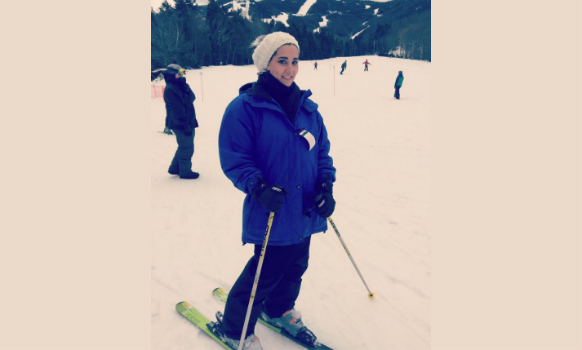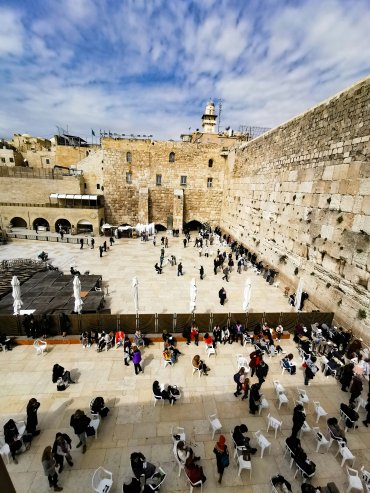How Mothers Can Connect to Spirituality During The High Holidays
“How was your yontiff?”
“Great! I made an amazing new recipe from Kosher Kourageous…”
“What about you, did you invest in yourself?”
“Sure, I got some new clothes.”
“What about spiritually?”
“Well, I went to shul with the kids to hear the shofar, and I made it through the fast, but you know how it is.”
It’s true, I do know how it is, but I had kind of forgotten.
For the past decade, I’ve been teaching in Jewish outreach situations all over the country during Rosh Hashanah and Yom Kippur, helping people connect to the day in ways other than davening in shul. As a woman, with flexibility in my tefillah obligations, I usually was the “instead of Musaf” speaker and on Yom Kippur, the “instead of Mincha” speaker as well.
This year, in Deerfield, Michigan, as part of the L’Chaim Center team, I participated in the 45 minute “family service” as I waited for my speaking slot after the first shofar blowing. It was so nice: most of the families arrived in time for kiddush, after the traditional morning service. Then the mechitza was pulled back and families sat together. There was singing, storytelling, some explanations of what Rosh Hashana is and what the shofar is, a little more singing and then a short shofar blowing, just enough to engage, enrich and fulfill minimum halachic obligations. Then the kids left with madrichot to make a birthday party for the world while the parents stayed for a little longer. When musaf began they got to choose to stay or to go to my class.
For the first time this year, I wondered, why don’t we do this for observant women and their children? Why is this only for “outreach”?
What would it be like in our orthodox shul if, instead of seating only pre and post young-children women for the regular services, and then filling to beyond capacity for a few moments of shofar blowing with all the midst-of-child-rearing women and their children, and then clearing out again for the rest of davening, we did something different? What if, instead of a few minutes of listening to the shofar in shul being the whole communal High Holy Day experience for those women and their children, we had a moms and kids “Rosh Hashana experience”?
Then I went to a pre-Yom Kippur concert where we sang with the band. It was a real kavana builder: liturgical songs mixed with English adaptations, thoughts about what we are leaving behind and who we can become, who we can forgive and from whom we need to seek forgiveness. It really impacted my davening on Yom Kippur.
Last year I left my job in Jewish outreach and this year I’ve moved to Chizuk: helping observant women feel more connected. I have been part of creating a new organization, “Core”, whose mission is to strengthen observant women, and it has really gotten me thinking.
What about women in other communities? How could we help them feel more connected? What about if they don’t want to go to shul? How can they feel more connected at home?
What about Simchas Torah while the men are dancing, or getting all those aliyahs? Some women love to watch. And some women wish for more.
Just this morning, in a WhatsApp group that I run, a Rebbitzen of a congregation posed this question: “…any ideas to engage and create a special experience for the women on Simchas Torah? I have to admit to tend to dread it myself…”
Discussion ensued: a beit midrash type shiur for women, each woman sharing a short thought on a parsha so that the women can “finish” the Torah together, or, if that’s too long, perhaps just 7 women sharing something about each of the 7 days of creation, dancing for women and then during aliyahs a shiur by the rabbi, a chocolate Kiddush with a mini shiur, a special singing shiur learning more about the Simchas Torah songs followed by a women’s Kiddush…
The quest is connection.
How do women connect? With Hashem, with His Torah, with the holidays, with each other? It seems that in this age, with all that is going on at work, at home and in cyberspace, the answers might be different than they were in the past.
I’d love to hear from you. What do you love? What do you want? What do you need to feel more connected? Really connected. Joie de vivre connected. Pass it on to your kids, friends and neighbors, and shine it into the world connected. Whether your ideas and wishes are for the High Holy Days, the other holidays, or for all year ‘round, I’d love to hear them.
Please comment below or email Aliza@coretorah.org.
Shana Tovah and Chag Sameyach!
If you found this content meaningful and want to help further our mission through our Keter, Makom, and Tikun branches, please consider becoming a Change Maker today.







